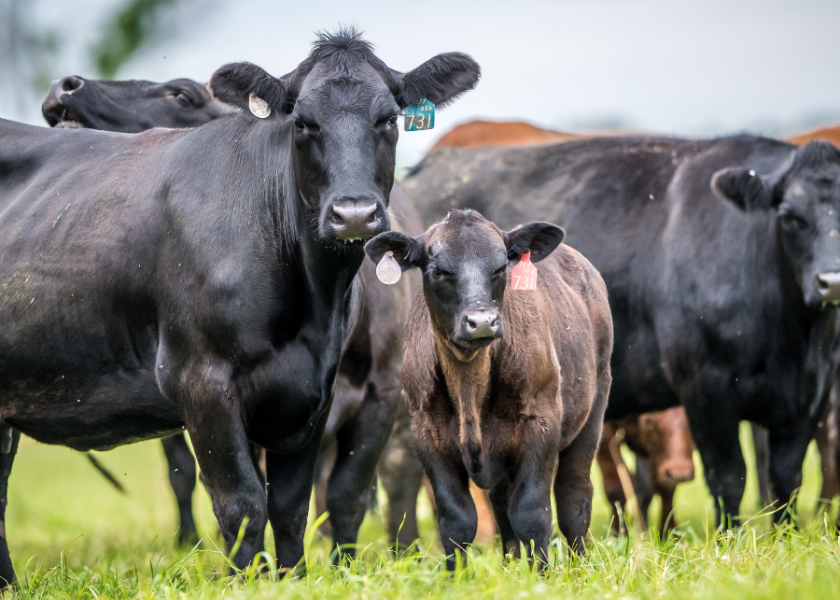Key Strategy to a Better-than-Average Herd

Things you can’t control: Increasing land prices. High feed costs. The price of calves.
Things you can control: Whether you test your commercial cow herd to help make genetic progress.
Basing decisions on data and insights can help you efficiently produce calves the market demands, putting your ranch in a strong position to make genetic progress.
“It’s a challenging but exciting time to be a commercial cow-calf producer, particularly around technology,” says Dr. Kent Andersen, Zoetis. “It is amazing what Tissue Sampling Units (TSUs) from candidate replacement heifers sent to our genetics lab unlock. Genetic predictions for over 15 traits and several economic indexes enable ranchers to select replacements that are more likely to make the most productive cows.”
Historically, other than when buying bulls, Andersen said, only seedstock producers have had access to such a wealth of genetic information.
Andersen also emphasized why using genetic predictions to make informed replacement female decisions can help ranchers manage costs and boost revenues.
“As a cow/calf producer, you want to accelerate your path to managing costs, while improving reproduction and having larger numbers of higher valued calves to sell,” says Andersen. “Genetic testing can complement your cowboy intuition, helping you select the heifers best aligned with your resources and production goals.”
Evaluating genetic testing for your herd
It’s important to consider how genetic testing can fit into your operation and how you can use the insights. A good starting goal is to focus on building an above average herd.
Start by considering your must-haves when selecting replacement heifers. It likely includes:
- High fertility and sustained reproductive performance over her lifetime
- Good mothering ability including unassisted calving, optimum milk, sound teat/udder quality, and fleshing ability
- Sensible mature cow size, maintenance requirements and associated feed costs
- Calm, even-tempered disposition and easy handling
- Lifetime of calves that grow efficiently and earn carcass premiums
Genetic testing and informed selection can favorably impact both costs and revenue. With tools such as INHERIT Select® and GeneMax® Advantage™, commercial cow/calf producers gain valuable predictions, including fertility, cow size and soundness; feed efficiency; milk, growth and carcass merit – as well as economic indexes that make the results easy-to-use. The predictions can help you improve your selection, breeding and marketing decisions.
You’ll see the results in the field, not just on paper. Informed decisions driven by genetics can help lead to better calves on the ground with efficient growth and more carcass merit, plus cows with longevity requiring less feed and with fewer headaches when calving.
Building a better cow herd
Lee Leachman, partner in Leachman Cattle of Colorado, has always been an advocate for genetic testing. His own personal mission is to simplify the selection process and make an impact on the rancher’s bottom dollar.
“There are a number of things you can’t see when you are selecting your replacement heifers,” says Leachman. “You cannot see or predict lifetime productivity, teat and udder quality as she ages, the amount of feed she’ll require to stay in body condition, or whether she’ll produce a high-value calf for the feedlot and on the rail.”
With proper trait selection, Leachman believes ranchers can build cow herds that deliver lower costs, better reproduction and higher valued calves.
“We’ve all picked out our favorite replacement heifer who is the big, good looking one who was born early, only to come back and find her open after her first calf,” says Leachman.
If you select for one characteristic, but ignore other factors that drive profit, it doesn’t work out well. It works better if you focus on a combination of key factors for your herd and operation at the same time, explains Leachman. Minimize your risk by combining your own instinct with genetic information.
INHERIT Select provides predictions for individual traits as well as three easy-to-use economic indexes, which rank animals for combined genetic merit.
- Zoetis Cow Calf Index is designed for producers who sell their calves at weaning.
- Zoetis Feedlot Carcass Index ranks animals based on combined genetic merit post-weaning traits, including gain, feed efficiency, carcass weight and grade.
- Zoetis Total Return Index ranks animals for genetic merit across all evaluated traits.
Similarly, GeneMax Advantage includes the Cow, Feeder and Total Advantage indexes designed to rank females that are 75% black Angus and higher for differences in net return across these segments of production.
When used to inform selection and breeding decisions, genetic testing can help you produce more efficient, productive cattle and help you deliver the calves the market demands.
Zoetis offers free TSUs to help get you started. Visit INHERITprogress.com or GeneMaxAngus.com to schedule a meeting with a rep and get started with genetic testing.
“Making investments today gives us a better chance of doing what we love tomorrow,” summarizes Leachman.
All trademarks are the property of Zoetis Services LLC or a related company or a licensor unless otherwise noted. Genemax is a registered trademark of Angus Genetics, Inc. ©2022 Zoetis Services LLC. All rights reserved. INH-00048







